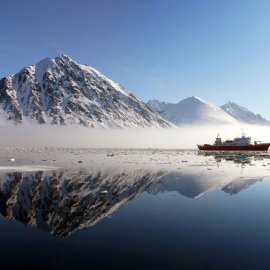The Ongoing Race for Arctic Oil
-
English
-
ListenPause
Welcome to World Ocean Radio… I’m Peter Neill, Director of the World Ocean Observatory. Oil, and the spoils of oil, are an ongoing siren song of temptation, and, even with all the accidents, resultant pollution, environmental damage, and impact of foreign investment on local economies, the pursuit continues. Oil remains an enormous percentage of financial return for governments and corporations in Saudi Arabia, Russia, the United Kingdom, Norway, and the United States, where the critical supply remains at the heart of economic viability and growth. For years, oil in the Gulf of Mexico and Alaskan waters has dictated tax policy, local development, and regulatory controls, accidents and spills notwithstanding, even as the global market price declines and alternative energy technologies emerge to displace new investments and future returns. Paradox abounds. Saudi Arabia announces a major new strategy to switch energy generation from oil to solar. Norway announces major social programs, new technologies, and other investment strategies looking beyond oil dependence. The United States vacillates from administration to administration, from subsidy and support for sun and wind energy innovation to a return to the old drill-baby drill sale of new licenses even in places where the practicality for drilling as already proven unfeasible and dangerous. Russian continues its own independent reliance on oil and gas as its major economic export even as geo-political leverage of that strategy declines. In a recent article in Ocean News & Technology, a headline questions: “Is America Losing Out in Race for Arctic Oil?” The article describes the position of the US Secretary of State Rex Tillerson, the former Chairman of Exxon-Mobil, quoting this statement: “The Arctic is important today and it’s going to be increasingly important in the future, particularly those waterways opened up. I can tell you that the US is behind…all the other Arctic nations. The Russians have made it a strategy priority.” This statement echoes from decades past – the same indiscriminate focus on economic competition and strategic geo-political positioning, even as Tillerson’s own government cuts from the budget supportive services, icebreaker construction, regulatory controls, safety standards, and other political agreements. And then there is the specter of the Chinese. As technology advances, some of it is corrupted to serve this retro-spectral vision. Big data, machine learning, cloud computing, financed to private shareholder advantage at public taxpayer expense, is turned backward toward the search for new reservoirs of oil and gas in a complex calculation of who has the biggest reserves, who is going to control a world economy based on a bankrupt paradigm of growth at any cost until all the value is gone. Algorithms suddenly inform decision-making; automation removes the danger of the loss of human life in one of the most dangerous occupations on earth, regardless of the consequence of technical failure. The capacity to respond and clean-up after accidents remains no more fully developed that it was before. The impact on local communities becomes greater with the loss of jobs and lesser as funds for social programs remain unavailable, allocated elsewhere. And so we enter another circle down, and down again into the fossil fuel whirlpool, one turn further toward loss of control over any aspect of the destructive outcome with no concern for the future. It is at tragic entropic gyre without prescience or conscience. These events are difficult and energy consuming to resist and counter. In autocracies such as Saudi Arabia and Russia, there is little room to oppose. In the European nations, there is political push-back,. In the United States, the opposition is galvanized to fight in the courts of law and public opinion. What a waste of human energy that is, when all that resource and resourcefulness could be invested in the clean technology that is to come, inevitably as the market rejects the illogic of vested interest and fear of change and adopts process and politics that leaves old world values, structures, and behaviors behind. We will discuss these issues, and more, in future editions of World Ocean Radio. [outro music]
The pursuit for oil continues, even as many alternatives emerge and investments are displaced. In this episode of World Ocean Radio, host Peter Neill discusses the various governments around the world doubling down on their search for and extraction of oil, even as the world appears ready to move beyond the investment toward cleaner technologies.
About World Ocean Radio
Peter Neill, Director of the World Ocean Observatory and host of World Ocean Radio, provides coverage of a broad spectrum of ocean issues from science and education to advocacy and exemplary projects. World Ocean Radio, a project of the World Ocean Observatory, is a weekly series of five-minute audio essays available for syndicated use at no cost by college and community radio stations worldwide.
If you value World Ocean Radio, please consider becoming a Patreon Supporter today.
Image Credit
Svalbard, Norway
Thomas Hallermann | Marine Photobank
Learn More
< Ocean News & Technology: Is America Losing Out in Race for Arctic Oil?
- Login to post comments



